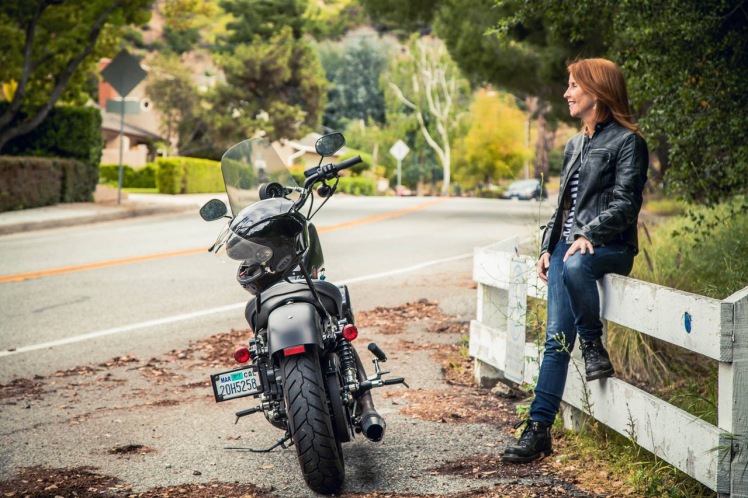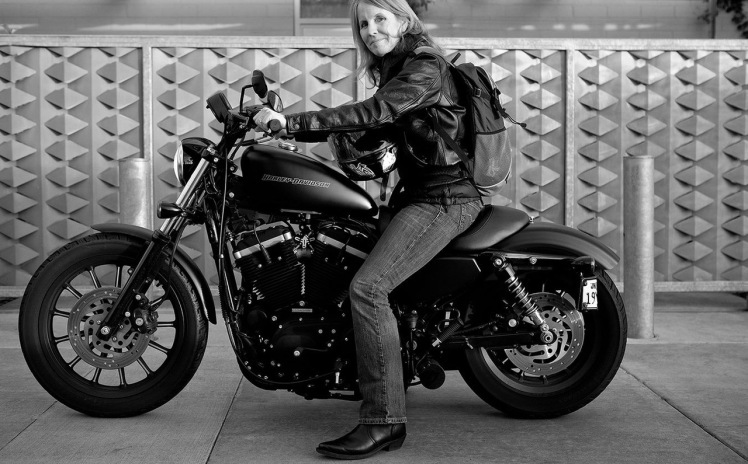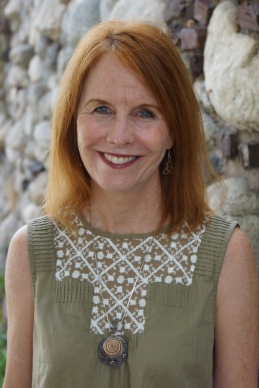Harley and Me: Embracing Risk on the Road to a More Authentic Life
By Bernadette Murphy
Counterpoint Press
2016 Hardback/2017 Paperback
Berkeley California
264 Pages/Memoir – $16.95
ISBN 978-1-61902-945-351695

Book Review by Sara Aranda
Summary/Highlights:
Bernadette Murphy is faced with her father’s death, a failing marriage, and a growing sense of worthlessness. She feels the weight of her life, or the lack of, rather, more than ever before. She realizes how unhappy she is, nearing 50, and how the woman she used to be – optimistic, courageous, and empowered – is basically dead. How does she jump-start the remaining 30-40 years she may have left? How does she survive as a single mother? While doing research for a book, she enrolls in a motorcycle safety class, and suddenly her life is changing in ways she could have never imagined.
She begins to embrace and understand risk, seeks advice from psychologists, professors, researchers, and other scientists throughout the book – digging deeper into the chemicals and activity of the brain when one is faced with decision, fear, pleasure, and reward.
“Most people are not willing to take on a healthy degree of risk, [Carl Lejuez] explains. They’re not expanding the balloon far enough to find the balance between risk and benefit. They cash out far too soon. As a species, he says, we have become much too conservative. This trend is especially notable as we age” (24).
Bernadette buys a Harley, ponders death and its potential benefits, volunteers for the charity Love Ride and practices riding until she’s ready to take on the long road across the country. She undergoes tremendous transformation, creates an unbreakable bond between herself and her jet-black sub-600lb Izzy Bella, and begins to analyze femininity in motorcycle culture. Although she and her husband finally separate and finds herself very much alone, she and her friends Rebecca, George, and Edna ride from Los Angeles to Milwaukee to join thousands of others at the 150th Harley anniversary celebration.
“Riding this morning, I feel genderless and ageless, more a point of consciousness than a person. Identity and all the ways it separates me from others flees in the face of swift movement, immense power, and the conviction I am somehow defying the bear-hug of gravity” (31).
“You’re so wholeheartedly immersed in what you’re doing that you cease to be aware of yourself as a separate entity. You lose yourself in the experience” (66).
The book takes you along the emotional, mental, and physical journey of self-discovery via a motorcycle, empty roads, and a brief stint of living in French Polynesia. Bernadette is even faced with a newfound sensuality and sexual appetite as she comes to experience “being fully in [her] body” after “maybe decades,” she writes (153). She finds herself noticing men again, which she hasn’t done since her teenage years; she dreams of sex and even experiences an unexpected orgasm while riding her motorcycle just outside of Milwaukee, inciting interest and research into Ben Wa Balls.
Her journey certainly doesn’t end with the return to Los Angeles. She starts spending a lot more time outdoors backpacking, climbing, and she even takes an ice climbing clinic in Ouray, Colorado. She finds love in another man, finally, because she has learned what she truly needs and how to trust herself first. But the biggest gain is a whole new understanding on how her life needed desperate change, novelty, and acceptance of failure. She battled guilt and loss, but she describes herself as a neophiliac and sees, for the first time, that Gay Hendricks was right about how “ ‘having a willingness to feel good and have life go well all the time is a genuinely radical act’ ” (121).

How I felt as the reader:
I can imagine that this memoir was quite difficult to write. Bernadette balanced science and memory very well, alternating between exposition and narrative. Her research was thorough and I really appreciate how deep she dove in to find out exactly what could potentially be taking place in her own brain. This insight also brought on new perspectives on my own personality and how I approach risk and novelty.
At first, I wasn’t sure if I was going to be able to relate to her story. She is much older than I, by two decades. Thus, in a lot of ways, I felt that what she underwent and discovered is something that my generation is already waking up to. But the more she went into the science and brain chemistry and the more honest she was about herself and her transformation, the more I felt drawn in. She ended up touching on numerous topics that I could relate to, such as the stereotyping of women, the search for male approval, anxiety, feeling lost in society, and the many different ways to approach risk and fear. I began to cherish her journey, and felt connected despite gender or age.
But what she writes about is certainly a phenomenon that is happening throughout society on an almost normal basis – the midlife crisis and failed marriage, as the woman who is blamed for destroying the family. My own parents decided to divorce when I was in 7th grade, and I’m pretty sure it was my mother who put down her foot. But the divorce was the best thing to happen to her – I felt like I was getting to know my mother for the first time. My early childhood memories are mostly of my father, whereas my teenage years are mostly of my mother. She became the modern-day Wonder Woman, raising 4 children, working full-time, and maintaining her passion for music and singing. She showed me how independent, self-motivated, and audacious women can be. And I saw much of the same in Bernadette’s narrative.
Bernadette even goes into the science of menopause and how Sandra Tsing Loh argues that:
” ‘it is not menopause that triggers the mind-altering and hormone-altering variation; the hormonal “disturbance” is actually fertility…It is during fertility that a female loses herself, and enters the cloud overly rich in estrogen. And of course, simply chronologically speaking, over the whole span of her life, the self-abnegation that fertility induces is not the norm’ ” (56-7).
Bernadette is essentially the perfect example of a failed American Dream, but she learns to maneuver through adversity by way of blind trust in what she is left with: herself and her new motorcycle. Plus, I feel that failed American Dreams are quite common, and it makes sense; expecting everyone to accomplish the same thing with the right amount of grace is ridiculous. So what I relate to the most in this book, I believe, is the discovery of alternative lifestyle and how it’s okay to not follow the cookie-cutter life path and demographic markers that deem you successful.

Things to consider:
Of course this is Bernadette’s story and hers alone. She is aware of the privilege that she has been bestowed as a white woman of a certain economic class. The very fact that amidst marital turmoil and family death she is able to afford a Harley is amazing. Or the fact that she has the ability to travel and take time away from work is a feat for many, particularly the working class. So I understand how this book should not be seen as a “self-help” book of advice or a tome of answers for those experiencing similar midlife crises. She presents herself, her journey, and all that she learned from it. Take from it what you will.
On a technical note, I felt that the Prologue was unnecessary and, frankly, not as strong as the writing in the rest of the book. I also felt that, throughout the narrative, she repeated/reiterated points that, after a while, felt superfluous.
Another interesting thought that came to mind was over one sentence in particular: “Just to get on a bike is to break prescribed gender roles even in this postfeminist age” (32). She also later identifies herself as a feminist. So I asked myself, how does one be a feminist in a postfeminist age? Why are there still prescribed gender roles in a postfeminist age? The phrase postfeminism makes me imagine a time where genders are finally equal and essentially genderless, that women in particular no longer need to advocate for equal rights and liberation from patriarchy/misogyny.
I looked into the term (thanks Wikipedia) and it describes an ideology that “strives towards the next stage in gender-related societal progress, and as such is often conceived as in favor of a society that is no longer defined by gender binary and gender role.” Yet even with this definition I am not convinced that we are all-together in a postfeminist age, especially if the majority of society still functions on binary gender roles. I can even use an example from today: I was going to help carry bags of soil to our geodesic dome and the woman pulling bags off the roof of the car said, “It’s not that heavy,” before handing it off to me. She of course didn’t give “warning” to any of the men, but reserved it for me. Her intent was benign, but I thought it funny that because of my gender she felt it appropriate to say such.
But I love that my mind was opened up to such a discussion. So if anything, this is not criticism on Bernadette’s words or views – I envy her optimism. I’m just glad that reading this book has offered many topics of conversation with not only myself, but with my husband too. I feel more informed, actually, on the science of risk, alternative perspectives, and I’m sure I’ll be quoting her book for quite some time.
Do I recommend this book?
Yes.
Other Memorable Quotes:
“And as long as you’re going [through] the effort, you might as well make it beautiful…Little by little I am grasping new ways of being” (209).
“It doesn’t matter if one is drawn to explore the great outdoors or the great books, ‘by becoming more curious and interested in life, you’ll also have a more curious and interesting life,’ says Paul Silvia, psychology professor at the University of North Carolina at Greensboro. ‘The tendency to either approach or avoid novelty is the most important stable behavioral difference among individuals in the same species, period’ ” (100).
“Rewilding, like the natural regeneration taking place on the coral reef, speaks to me of rebirth and my own personal evolution. I start to see my risk-taking adventures as more than just crazy dopamine fixes I crave. Perhaps I am rewilding my own ecosphere” (230).
“But in the long run, optimal experiences add up to a sense of determining the content of one’s life. And that, [Mihaly Csikszentmihalyi] argues, ‘comes as close to what is usually meant by happiness as anything we can conceivably imagine’ ” (71).
“I am running away from the saintliness aura I had bought into as a younger woman. But I’m not running toward its opposite, a kind of reckless decadence associated with both midlife crises and motorcycles. I am running away from a marriage that had begun to suffocate me, but I’m not looking for the arms of a new man to throw myself into. So, what then, am I looking for?” (135).
About the Author:

“Bernadette Murphy writes about literature, women, risk taking, and life — from motorcycles to neuroscience to knitting. She is an Associate Professor of Creative Writing at Antioch University Los Angeles. A former weekly book critic for the Los Angeles Times, her writing has appeared in Salon, Literary Hub, Climbing Magazine, The Rumpus, The Nervous Breakdown, New York Observer, Palm Springs Life, Ms. magazine, Los Angeles Times Magazine, San Francisco Chronicle, The Oregonian, San Jose Mercury News, Newsday, BOOK magazine, and elsewhere. Her essays and short stories have been in featured in anthologies, including: Knitting Yarns: Writers on Knitting, edited by Ann Hood; A Pink Suitcase: 22 Tales of Women’s Travel, edited by Janna Graber; Wild with Child: Adventures of Families in the Great Outdoors, edited by Jennifer Bove and Mark Jenkins; My Little Red Book, edited by Rachel Kauder Nalebuff; Our Working Lives: Short Stories of People and Work, edited by Larry Smith and Bonnie Jo Campbell, and others. She holds an MFA from Antioch University, Los Angeles and is the mother of three amazing young adults.” – Taken from her website.
*Disclosure: I was granted a free paperback copy for review.
Your review is so thorough and makes me want to head to the library and pick up this book! On a “postfeminism” note, I recently read an article about Arlene Blum who faced serious gender adversity in the 1970s when she executed the first all female expedition up Denali. Blum now feels the gender gap is, if not almost, then entirely closed. Reading that, along with the countless recent articles about feminism and the gender gap in the outdoor industry (Force of Nature Campaign, all-women’s outdoor organizations, Flash Foxy Festival, etc), I can’t help but wonder if these women are working under a comparative theory. It’s not as bad as it was, therefore it’s much better, or put more dramatically, solved. Like almost anything else in life, it comes down to perspective.
LikeLiked by 1 person
You’re absolutely right about it coming down to perspective. And you bring up a wonderful thought – what theories of feminism are all of these women working under? I’d love to find out. What a cool project/discussion that would be!
LikeLiked by 1 person
That would be interesting. Especially considering how “feminism” has been a dirty word for the part part of a century. Only until recently have women (and men) started identifying as feminist without fear of being ridiculed. I’d love to hear from a range of people what feminism means to them and how it relates to their lives, if at all.
LikeLiked by 1 person